'Perhaps the biggest indication was its striking decision in November to delink LeT from its aid certification process.'
'The administration decided that the US, in order to send military aid to Pakistan, would not need to certify that Pakistan is cracking down on LeT.'
'Perhaps the administration was trying to offer a carrot -- in effect, we're backing off on LeT, but in return we expect you (Pakistan) to go after the Haqqanis.'
'Either way, the optics were dreadful for the US given that Hafiz Saeed was released from house arrest a few days after the US move.'
'The US reacted angrily, but eventually it moved on, and refocused on its core concern: The Afghan-focused terror groups.'
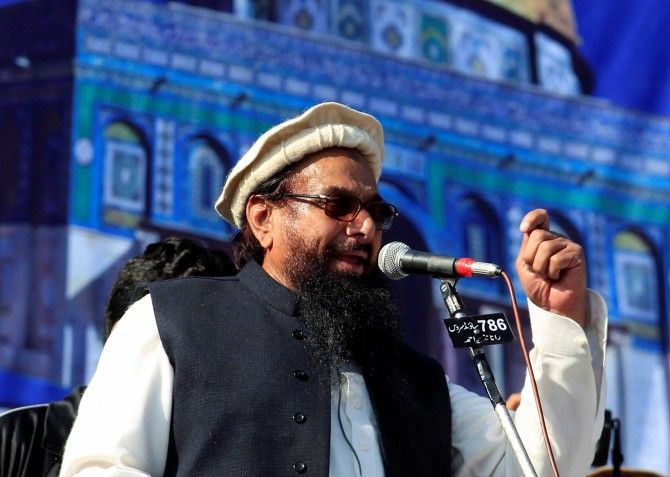
IMAGE: Lashkar-e-Tayiba terrorist Muhammad Saeed addresses a gathering in Rawalpindi, December 29, 2017, to protest against the US decision to recognise Jerusalem as Israel's capital. Photograph: Faisal Mahmood/Reuters
On New Year's Day 2018, the Donald J Trump administration in the United States delivered twin shocks to Pakistan.
First, US President Donald J Trump accused Pakistan of giving nothing to the US but 'lies and deceit' and providing a 'safe haven' to terrorists in return for the $33 billion Washington has given Islamabad since the war of terror began in October 2001.
'They give safe haven to the terrorists we hunt in Afghanistan, with little help. No more!' Trump tweeted.
The angry presidential tweet was followed by an official announcement that the US would suspend $255 million worthy of military assistance to Pakistan.
Resumption of aid, the US made clear, would depend on Islamabad's response to terrorism on its territory, Press Trust of India reported from Washington, DC.
'The president has made clear the US expects Pakistan to take decisive action against terrorists and militants on its soil, and that Pakistan's actions in support of the South Asia Strategy will ultimately determine the trajectory of our relationship, including future security assistance,' a US official, announcing the suspension of aid, said.
Pakistan's defence ministry fired back, alleging that it had got 'nothing but invective and mistrust' for its support of America's war against terror.
'Pak as anti-terror ally has given free to US: land & air communication, military bases & intel cooperation that decimated Al-Qaeda over last 16yrs, but they have given us nothing but invective & mistrust. They overlook cross-border safe havens of terrorists who murder Pakistanis,' the Pakistan defence ministry tweeted hours after the US decision was announced.
A day later, Pakistan Foreign Minister Khawaja Asif tweeted that Trump could hire a US-based audit firm 'on our expense' to verify if indeed Washington had given Islamabad $33 billion and 'let the world know who is lying and deceiving'.
Earlier, Pakistan military spokesman Major General Asif Ghafoor claimed the US aid was reimbursement for support' Islamabad had provided the US-led Western coalition in its battle against al-Qaeda.
'Had we not supported the US and Afghanistan,' General Ghafoor claimed, 'they would never have been able to defeat al-Qaeda.'
The US decision provoked Prime Minister Shahid Khaqan Abbasi to summon a meeting of Pakistan's national security council on Wednesday, January 3. Shortly before the NSC meeting began, corps commanders met at the Pakistan army's headquarters in Rawalpindi.
On Thursday, PTI reported, the US further suspended about $2 billion security assistance to Pakistan for failing to take 'decisive action' against the Taliban and the Haqqani Network.
On Saturday, January 6, PTI reported, the US warned that it is keeping 'all options' on the table to deal with Pakistan if it does not take decisive action against the Taliban and the Haqqanis.

To make sense of the swiftly moving developments, Rediff.com turned to Michael Kugelman, deputy director and senior associate for the South Asia programme at the Wilson Centre, the Washington, DC-based think-tank.
As he has so often done before (please see here; here; here; here), Michael, left, eloquently explains the reasons for the Trump administration's anger with Pakistan and highlights its consequences for India and the region.
An e-mail interview with Nikhil Lakshman.
What provoked the US decision? One knew the Pakistanis have tried the American patience for years, but was there, in your understanding, a major recent provocation that caused the US to withhold military assistance to Pakistan?
One could identify several possible triggers for the aid freeze decision -- some observers may cite the release of Hafiz Saeed from house arrest in November --but my sense is that the triggering provocation was Pakistan's refusal to grant the US access to the Haqqani Network fighter that Pakistan arrested during the operation to free the Colman-Boyle family.
That said, I think this aid freeze was inevitable and didn't just happen because of Pakistan's unwillingness to give the US access to that captured Haqqani Network militant.
From the time the Trump administration took office, it had expressed exasperation and impatience with Pakistan's selective policy toward terrorism.
There had been several telltale signs that an aid suspension was in the cards.
Trump's South Asia strategy, released in August, as well as his national security strategy released in December both indicated that the US is not willing to provide aid to a country that's not cracking down on the terrorists that target US soldiers in Afghanistan.
So I think that the aid freeze was in the works for quite some time. Trump's New Year's Day tweet essentially previewed what was to come, and then I imagine his deputies had to scramble to formally put the freeze in place.
This may explain why the Trump administration has seemed a bit unorganised ever since it announced the freeze, as evidenced in particular by the wildly fluctuating amounts of aid that different administration officials have said will be frozen.
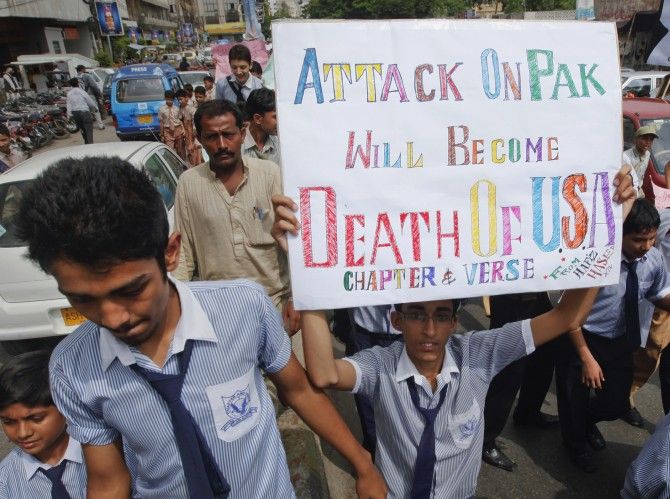
IMAGE: High school students take part in an anti-American demonstration in Karachi, September 28, 2011.
Washington accused Pakistan's powerful ISI spy agency of directly backing the Afghan Taliban-allied Haqqani Network and providing support for the September 13, 2011 attack on the US embassy in Kabul.
Pakistan furiously rejected the allegations and warned the US that it risked losing an ally if it kept publicly criticising Pakistan.
Photograph: Athar Hussain/Reuters
Surely, the Bush and Obama administrations were aware that all the money they were pouring into Pakistan was not really going into anti-terror operations. Much of the money was going into building up Pakistan's war machine directed against India.
Why did those administrations not take the decisive actions that the Trump administration has now done?
In your understanding, what were the compulsions that stayed the Bush and Obama administrations' hands?
First, as a caveat, I'm not sure that the Trump administration has taken 'decisive actions' just yet.
What it's done so far is declare an aid freeze -- and previous administrations, including the Obama White House after the raid on bin Laden's compound -- have implemented their own aid freezes.
It's true though that the Trump administration has been much more frank and harsh in its rhetoric, and has given a much stronger indication than did its two predecessors that it will take a harder line with Pakistan.
In terms of what may have held Bush and Obama back, there's a lot to unpack here, and the factors are different in each case.
With Bush, Pakistan -- especially early in his term -- was viewed as an important counter-terrorism partner.
After the 9/11 attacks, (then Pakistan's military ruler) General (Pervez) Musharraf vowed to work closely with Washington, and many US officials believed the notion -- put out there by Musharraf himself -- that Musharraf was the only one that could prevent Pakistan from collapsing into instability and becoming over-run by militants.
In other words, Musharraf was projecting himself as Pakistan's saviour, a characterisation the Pakistani military often projects of itself -- and Washington believed him.
So there was no way that Washington was going to pressure the Pakistanis when it considered Musharraf to be such an important partner.
I'd argue, however, that the core factor explaining why previous administrations didn't take a harder line was the US war in Afghanistan.
This shouldn't be a surprise, given that Washington has long viewed Pakistan through the lens of Afghanistan.
Whether rightly or wrongly, the US has sought Pakistan's assistance with the war -- and with pursuing peace with the Taliban.
It has been very cautious in terms of how it treats Pakistan so as not to overly provoke the Pakistanis, knowing that Pakistan could retaliate by shutting down the NATO supply lines on its soil, thereby complicating US war efforts in Afghanistan in a big way.
Back in 2011, when Pakistan shut down the supply lines during a difficult period in US-Pakistan relations, the US was forced to use more costly and circuitous routes in Central Asia. It was by no means ideal.
Today, the calculus has changed a bit. The US is no longer fighting a combat war in Afghanistan, and it has many fewer troops on the ground than it did back in 2011, during the height of the troop surge.
I imagine one reason Washington has been willing to push Pakistan harder is that it feels that the impacts of Pakistan shutting down the supply routes would not be as damaging as they would have been several years back, when the US had a larger military presence in Afghanistan.
In fact, this interpretation is questionable, and I'd argue that a supply line closure would still be quite damaging for the US -- especially as a troubled relationship with Russia would make it difficult for the US to negotiate the use of the alternate supply lines in Russia's backyard.
Also, the Taliban is much stronger than it was several years back, and any added complication to the US war effort will make its job all the more difficult.
Still, I do think the lighter US military footprint in Afghanistan is a major factor explaining the US's increased pressure on Pakistan.
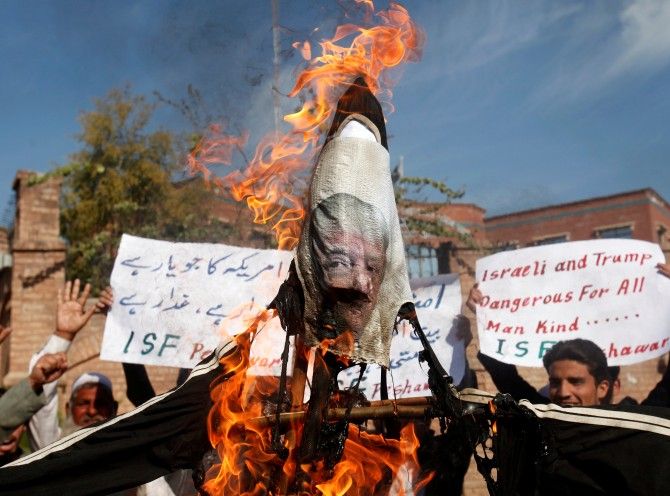
IMAGE: Protesters in Peshawar burn an effigy of US President Donald J Trump in response to his recognition of Jerusalem as Israel's capital, December 8, 2017. Photograph: Fayaz Aziz/Reuters
Is the Pentagon -- and the triumvirate of generals who currently dominate US national security policy -- frustrated that the Ashraf Ghani government is now under daily siege from terrorists like the Taliban who are perceived to have the active encouragement of the Pakistan military establishment?
I imagine it is. The Pentagon -- and the US government on the whole -- are very much behind the Afghan government, and sympathise with its many struggles -- most especially terrorism.
The US-Afghan partnership is stronger now than it has been in quite some time -- and night and day compared with the state of relations during the (Hamid) Karzai administration.
US-Afghan comity means that Washington is very much on the same page as Kabul on key policy issues, including on the issue of Pakistan's role in the insurgency.
I don't think it's fair to say that the terrorism and insurgency playing out in Afghanistan is uniquely attributable to Pakistan's support for the Taliban.
There are other factors as well; I'd argue that corruption, poverty, warlordism, and the Afghan government's inability to rein these problems in have contributed to an environment that gives the Taliban many propaganda victories and enables it to maintain a steady stream of recruits.
However, I think that these days, when considering the sources of the Taliban's strength, both Kabul and Washington fixate on the Pakistan problem to the detriment of these local governance factors in Afghanistan.
Given all these considerations, we can be quite sure that US officials are not only frustrated by what the Afghan government is going through, but also quite sympathetic -- and in fact this US support and sympathy for Kabul may help drive US inclinations to take a harder line with Pakistan.
Why has Washington been unable to make any headway with Islamabad on the Afghan issue?
Do you think the Pakistan military feels more aggreived on the Afghan issue after the Trump administration recently highlighted India's role in Afghanistan?
The Afghanistan issue plays directly into Pakistan's obsession with India, as Pakistan has long accused India of using Afghan territory to organise and stage acts of meddling and destabilisation in Pakistan.
This helps explain why Pakistan insists on maintaining ties to the Afghan Taliban and the Haqqani Network -- it views them as a useful asymmetric asset to push back against the presence of its more powerful Indian foe in Afghanistan.
In other words, Pakistan has very strong interests in maintaining ties to these groups, which, of course, leads to a fundamental disagreement with Washington.
There has long been a fundamental disconnect between the US and Pakistan when it comes to Afghanistan, and Trump's call for India to step up its game in Afghanistan transformed a disconnect into a point of very high tension.
And it's a point of tension that has intensified amid Washington's refusal to give credence to Pakistani claims that Afghanistan provides sanctuary to terrorists like the Pakistani Taliban that stage attacks in Pakistan.
I've not come across one US official who is sympathetic to this Pakistani allegation of Afghanistan-based sanctuaries for anti-Pakistan terrorists.
The US government, rightly in my view, points out that Afghan and US forces in Afghanistan are making very real efforts to go after not only the Afghan Taliban, but also Pakistani Taliban and ISIS fighters and other militants based in Afghanistan that pose a threat to Pakistan.
This isn't to say that there aren't anti-Pakistan terrorists in Afghanistan -- they are there for sure -- but Washington largely does not agree with Pakistan that the Afghan State provides sanctuary and other support to them.
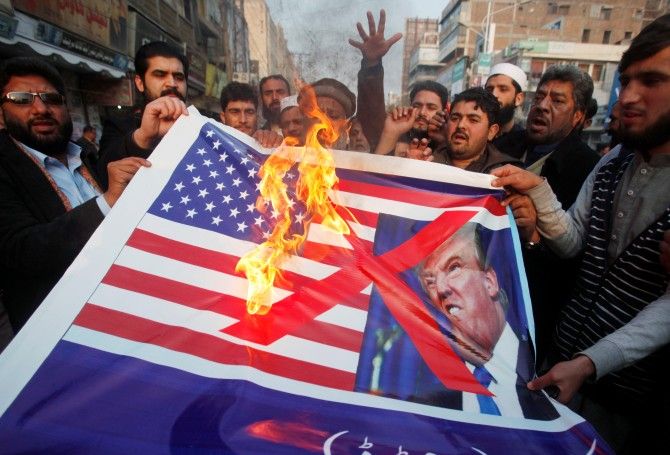
IMAGE: Pakistanis burn a US flag and a picture of US President Donald J Trump at an anti-US rally in Peshawar, January 5, 2018. Photograph: Fayaz Aziz/Reuters
Would you consider this withholding of US military aid significant?
Or is it par for the course -- a threat to elicit definitive Pakistani cooperation on terror networks like the Haqqanis who endanger American forces bin Afghanistan?
Quite frankly, I think that the significance and potential impact of this aid freeze has been widely overstated.
First, there's nothing new about Washington freezing aid monies for Pakistan; the US has done it before.
Second, this aid suspension will not exactly deliver a crippling blow to the Pakistani military.
To be sure, it will hurt, given that the Pakistani security establishment does value the military hardware it gets from the US.
There is also a prestige factor associated with getting the likes of F16s, for example, from the world's most powerful military.
However, as US-Pakistan defence relations have struggled in recent years -- don't forget that in its final months in office the Obama administration refused to sign off on an F16 deal to Pakistan -- the Pakistanis have been looking elsewhere.
Pakistan will be able to compensate by looking to Saudi Arabia, certainly to China, and perhaps also, on more modest levels, to Russia.
Third, an aid cut won't make Pakistan crack down on the terrorists that target US troops in Afghanistan. Let's be clear about this. And I'm sure the Trump administration is well aware of that.
This aid freeze, in my view, is meant to be more of a signal of frustration than a tool of coercion.
And the implication, as hinted at in the comments of White House officials, is that harsher tools -- those that the administration, rightly or wrongly, believes can actually induce policy shifts from Pakistan -- could be deployed in due course.
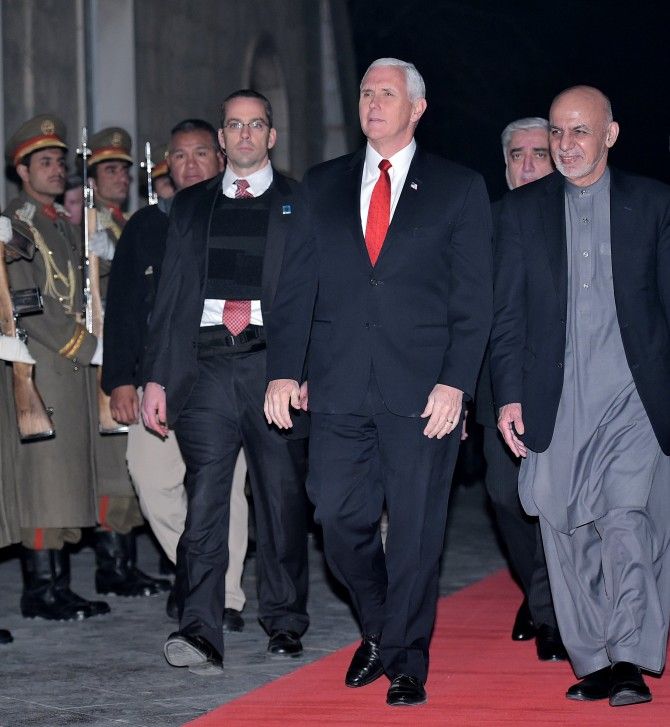
IMAGE: US Vice President Mike Pence, left, inspects an honour guard with Afghanistan President Ashraf Ghani, second from right, and Afghan CEO Dr Abdullah Abdullah, third from right, at the presidential palace in Kabul, December 21, 2017. Photograph: Mandel Ngan/Reuters
Is the Trump administration angry because the Pakistanis are not playing ball on the Afghan front?
It has nothing to do with Pakistani belligerence on its eastern front, the encouragement to terror groups like the Lashkar-e-Tayiba and Jaish-e-Mohammed, right?
The Americans have not censured the Pakistanis for releasing a man they put a $10 million bounty on.
For the Trump administration, the Afghanistan-focused terrorists are a priority over India-focused terrorists.
This isn't to say at all that it doesn't care about LeT and JeM. Far from it.
Indeed, US officials often note that several Americans were killed in the Mumbai attacks of 2008. As the US-India relationship continues to grow, I imagine that US pressure on India-focused terror groups in Pakistan will increase.
But for now, the White House is focused laser-like on the Afghanistan-focused groups located in Pakistan's west.
There's a very simple reason for this. For the Trump administration, the paramount goal in South Asia -- and overseas on the whole -- is to protect American lives.
I have heard a very senior US official in the White House say this very explicitly. It's the Afghanistan-focused terror groups that pose the greatest threat to Americans, because they are attacking US troops in Afghanistan.
LeT and JeM certainly pose threats to Americans as well, but they are not actively fighting the US in Afghanistan (though these two groups, particularly LeT, likely have some type of presence there).
Perhaps the biggest indication of the Trump administration's greater focus on the Afghanistan-focused groups was its striking decision in November to delink LeT from its aid certification process.
In other words, the Trump administration decided that the US, in order to send military aid to Pakistan, would not need to certify that Pakistan is cracking down on LeT. The Haqqani network, by contrast, was not delinked from the list.
Perhaps the Trump administration was trying to offer a carrot -- in effect, we're backing off on LeT, but in return we expect you to go after the Haqqanis in a big way.
Either way, the optics were rather dreadful for the US, given that Hafiz Saeed was released from house arrest just a few days after the US move.
The US reacted angrily and issued condemnatory statements, but eventually it moved on, and refocused on its core concern: The Afghanistan-focused terror groups.
- PART 2 of the interview: 'US may help India in war against terror'


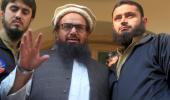








 © 2025
© 2025